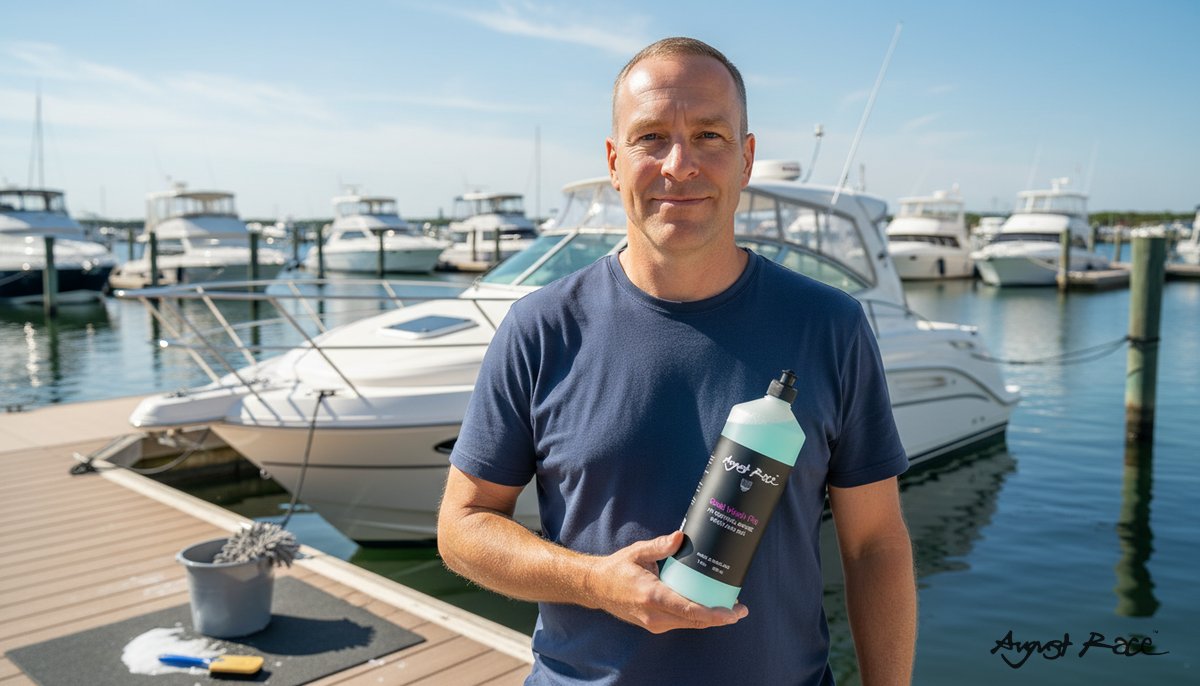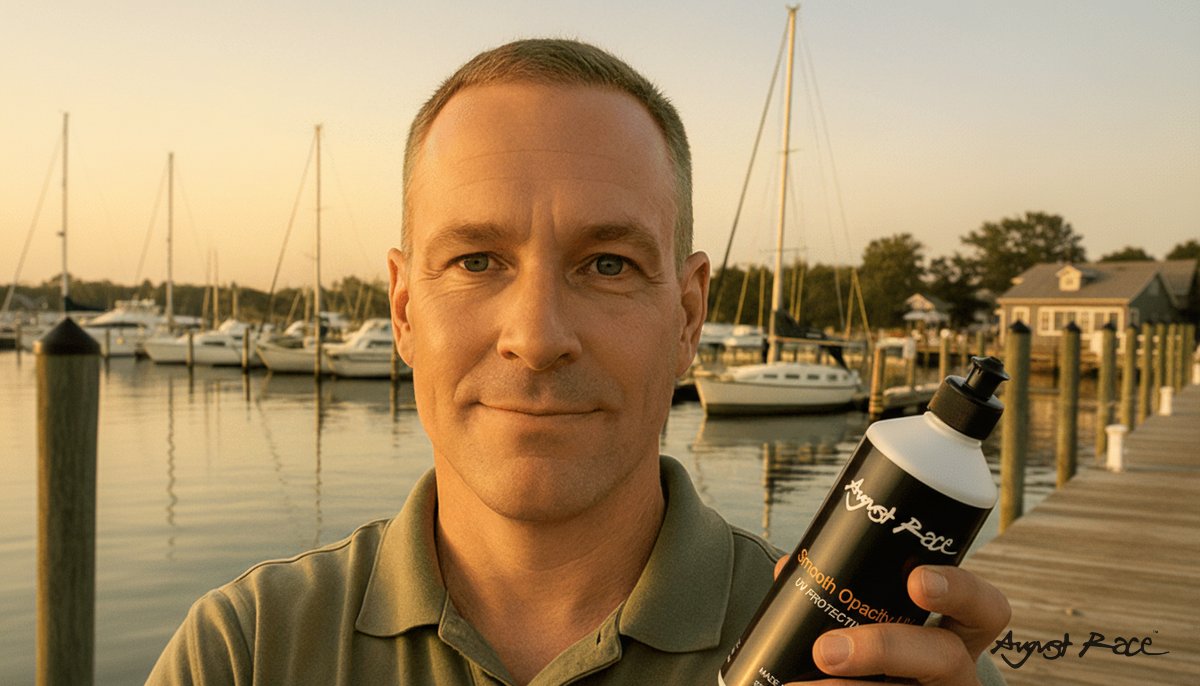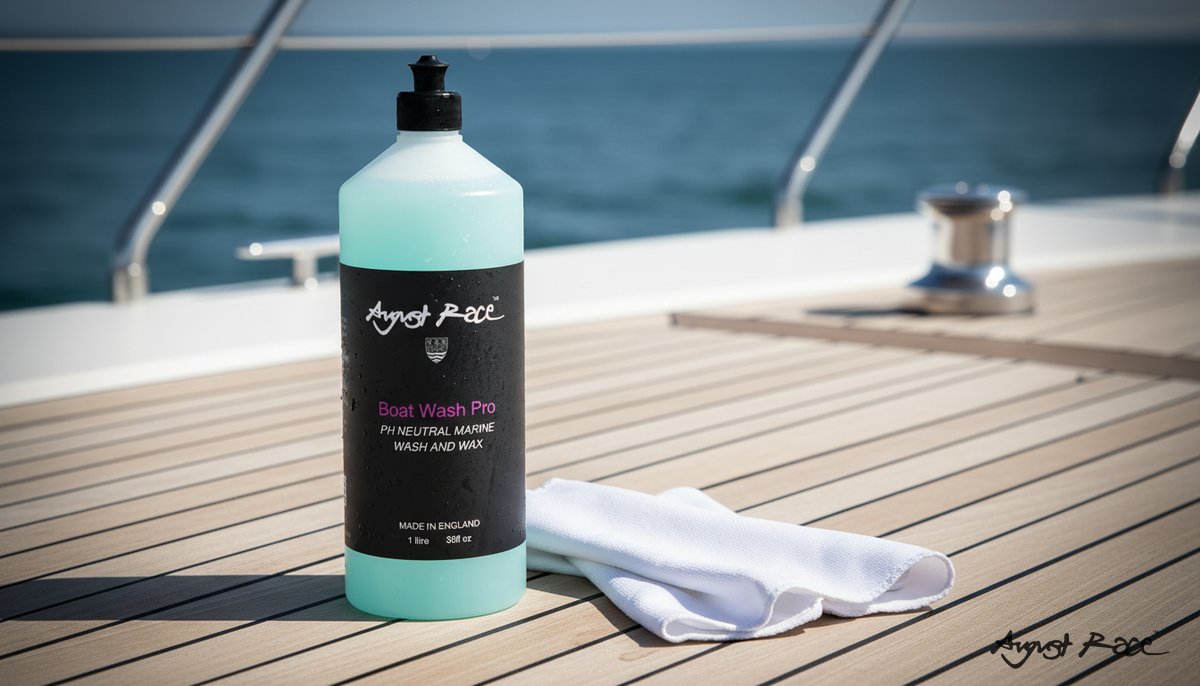Will muriatic acid hurt fiberglass? Safer cleaning with August Race Boat Wash Pro
Quick Answer
- Yes. Concentrated muriatic acid can etch, dull, or discolor fiberglass gelcoat and strip protective wax.
- Risk rises with stronger mixes, longer contact time, and warm surfaces. A fast rinse after a small splash is less likely to mark the finish.
- Use a purpose-made marine cleaner like August Race Boat Wash Pro instead of acid when cleaning gelcoat.
Quick answer: can muriatic acid hurt fiberglass?
In short, yes. Muriatic acid is a strong form of hydrochloric acid. On gelcoat, it can bite into the surface, leaving cloudy or chalky patches, and it removes wax or sealant fast. The risk goes up with concentration, dwell time, and heat. If you are chasing rust stains near stainless fittings, skip the acid unless you are working on bare fiberglass and know the risks.
If you want a safer route, reach for August Race Boat Wash Pro. It is formulated for marine surfaces so you can clean without jumping straight to harsh acids.
If muriatic acid touched the gelcoat: immediate steps
- Rinse immediately with plenty of fresh water. Keep flushing for several minutes to dilute and carry away any residue.
- Neutralize any leftover acid. Mix a baking soda solution at 1 to 2 tablespoons per quart of water, flood the area, let it sit briefly, then rinse again.
- Wear gloves and eye protection, and ventilate the area.
- Wash the spot with a gentle marine soap or August Race Boat Wash Pro, then let it dry and assess for etching or discoloration.
For that post-neutralize clean, Boat Wash Pro is pH-balanced and designed to lift grime and light stains from gelcoat without introducing harsh acids. Always test a small hidden area first and check results in good light.
Why choose August Race Boat Wash Pro over DIY acid mixes or generic cleaners?
- Designed for marine finishes: Safe for gelcoat, painted surfaces, and stainless fittings when used as directed.
- Less risk than DIY acid mixes: You avoid concentrated acid exposure that commonly clouds or etches gelcoat.
- Saves time and reduces rework: A proper boat wash often removes rust halos and residue with less scrubbing than repeat home-brew attempts.
- Practical tip: always test in a hidden spot. No product is 100 percent risk-free, but purpose-made marine cleaners reduce the odds of costly damage.
FAQs
Q: Can I use diluted muriatic acid safely on gelcoat if I am careful?
A: Even diluted, it is risky. If the mix is off or it dwells too long, you can end up with cloudy or etched spots. Start with a marine cleaner like August Race Boat Wash Pro and reserve strong acids for specialty work when you fully understand the risks.
Q: What if the rust stain does not budge after washing?
A: Try a second pass with Boat Wash Pro and a soft brush, then rinse and reassess. For stubborn staining, step up to a gelcoat-safe rust remover and always test in a hidden area first.
About the Author
August Race Team
The August Race professional team brings decades of marine industry expertise and product development knowledge.
Get Expert Tips
Subscribe for marine care insights and product updates from industry professionals.
No spam. Unsubscribe anytime.
You May Also Like

Restore Faded Fiberglass: GRP Repair Guide
Yes, faded fiberglass (GRP) can often be restored with cleaning, compounding, polishing, and UV sealer. Learn when restoration works and how to protect the finish.

Salt Removal Boat Care with August Race Boat Wash Pro
Cut saltwater stains and gelcoat grime fast. pH-neutral, biodegradable wash for fleets, RIBs, and yachts -- save rinse cycles at your marina.

Fix Oxidized Gelcoat Fast: A Marina Manager’s Guide
Restore oxidized gelcoat fast at scale. Our marina-tested workflow plus Smooth Opacity UV adds lasting UV protection and cuts rework across multiple boats.
